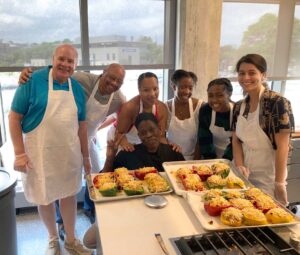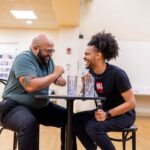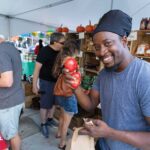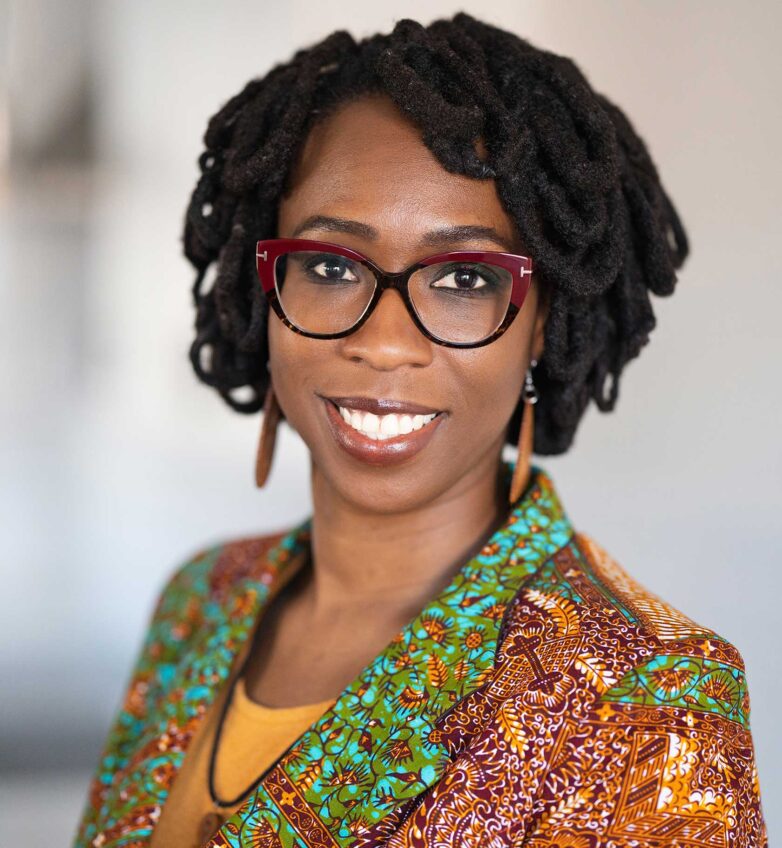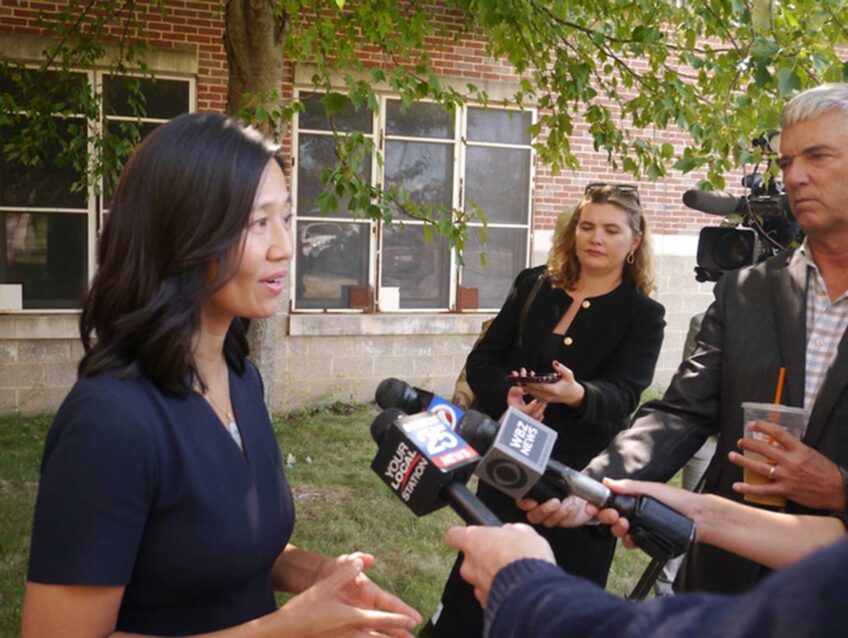Nutrition Lab serves Roxbury through cooking
New program brings chef-in-residence to BPL teaching kitchen
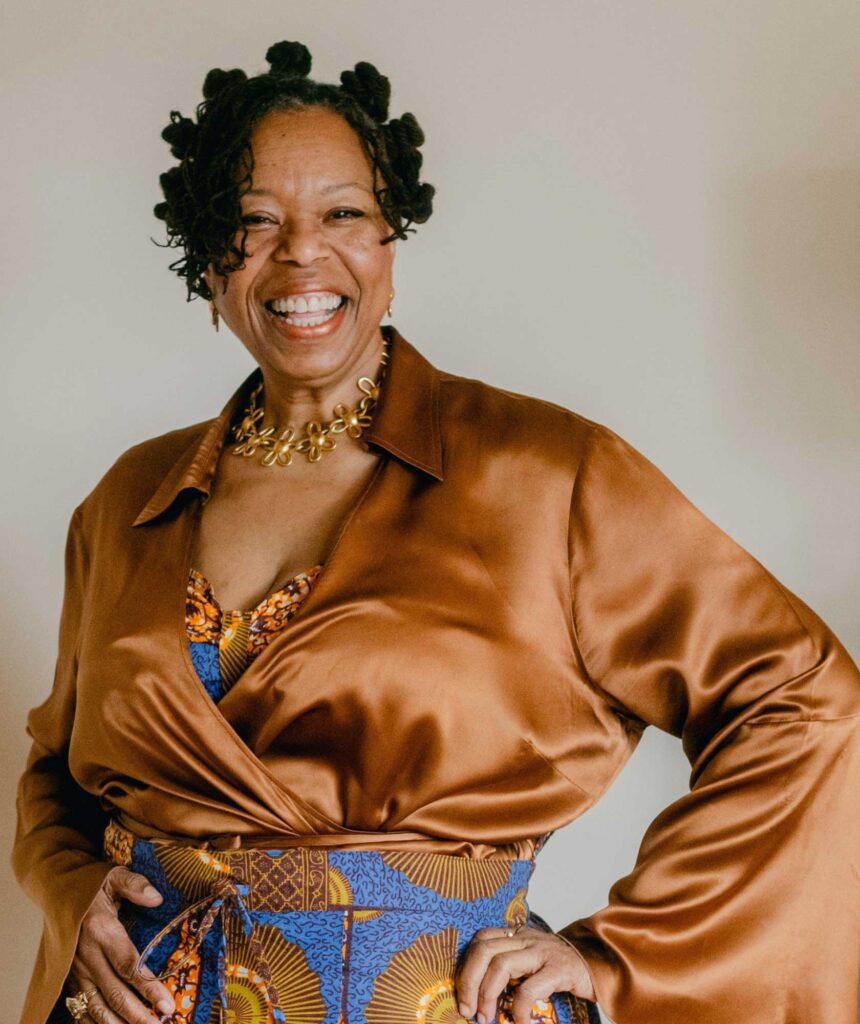
Glorya Fernandez grew up in a Caribbean household in Cambridge where cooking was obligatory. Her family is West Indian from Barbados, and she was raised by an aunt who “could make spam taste like steak.”
As a young girl, Fernandez was surrounded by immigrant women who cooked for their families and for a living, one of the only ways they could make money.
“Baking and cooking was always here,” the chef said, lifting two fingers to her head. “But it wasn’t always here,” she added, wiggling her fingertips.
Behind her is a cylindrical contraption with tendril-like attachments. From its sides protrude green leaves of varying sizes and shades. Speaking via Zoom, Fernandez identifies the tall, white apparatus as a tower garden that she is using to grow an assortment of fruits and vegetables: cucumber, zucchini, kale, lettuce, herbs and even a watermelon. The indoor garden is both environmentally friendly, she said, and convenient for her third-floor Roxbury apartment.
Food has always been a source of comfort for Fernandez. She struggled with her weight for years, but found solace in cooking, especially plant-based foods. Although the 62-year-old said she is still healing her relationship with it, her fondest childhood memories were formed around food.
When she realized food was her passion, she pursued a culinary arts certification at New England Culinary Arts Training, worked in the kitchen at Boston Health Care for The Homeless Program and seized cooking opportunities offered to her by friends. She later founded gogobytes, a food and nutrition company.
Fernandez is now bringing both her personal and professional experience to the Roxbury branch of the Boston Public Library’s Nutrition Lab as its inaugural chef-in-residence. The newly formed program brings a chef into the library’s Nutrition Lab, a teaching kitchen focused on nutrition literacy, to lead classes and workshops for a year.
“I just wish we had that same vigor about making sure we have like all kinds of healthy foods available to us,” she said, referring to the activism around the shutting down of pharmacies in neighborhoods like Roxbury. “We need to bring that excitement about knowing we can heal ourselves with the food,” she added, which she intends to do in the Nutrition Lab.
Stephanie Chace, nutritional literacy coordinator for the Boston Public Library, said for its first chef-in-residence, the library was looking for someone who was a good teacher and listener, had professional culinary experience and ideally lived in Roxbury. Fernandez’s welcoming personality and warmth made her a standout candidate.
Chace and Fernandez are teaming up to kickstart the new program and expand the Nutrition Lab’s current offerings.
“Nutrition literacy gives people an opportunity to feed themselves and feed others,” said Chace. “I think it’s important especially because for many neighborhoods there could be a gap in education around food.” It empowers community members who might not have time to cook or simply don’t like to cook. Food also provides an avenue for connection, Chace said, especially in Roxbury, a “close community” where gathering is important.
To ensure that the chef-in-residence program is meeting community needs, the library will hold a listening session with Fernandez on April 8, the second one of this spring, to garner community input and give people the opportunity to get to know Fernandez. During a listening session held in March, community members expressed interest in learning how to bake, Chace said, which the Nutrition Lab plans to implement.
For now, Fernandez is researching the history of Roxbury, which includes diving into cookbooks from the 1800s and considering how to include those centuries-old recipes in her teaching.
She’s also exploring the Indigenous communities who once owned the land upon which Roxbury now stands. All her research will inform her curriculum, which will center on basic kitchen acclimation: knife skills, intuitive measuring, ingredient tasting and more.
“My motto is: I take familiar items and prepare them in an unfamiliar way. And I take unfamiliar items and try to prepare them in a familiar way,” said Fernandez. In the past, she has made pancakes out of teff, an ancient grain from East Africa. She said she hopes to encourage students to think creatively in the same way and to bring healing to the community through food.
“I also would like to really build on what folks are getting from pantries, and a lot of the stuff they get from pantries can be tricky,” said Fernandez. The usual options — canned beans, dried pasta, white wheat flour — have little nutritional value. She said she plans to teach people how to add to their diets by, for example, incorporating grated carrots into boxed mac and cheese.
The chef-in-residence program is made possible through a private donation and is the latest addition to Nutrition Lab’s free programming. The Nutrition Lab started in late 2021 when the library underwent a renovation, adding a sleek teaching kitchen to its building as requested by the community, Chace said.
It is funded through the library’s philanthropic arm, the Boston Public Library Fund, and consists of donations and grants from private entities such as the city of Boston, Point32Health Foundation, Mass Development, and more.
The kitchen accommodates 12-15 people at a time and supplies non-perishable food items such as spices, flour and canned goods, and the chefs bring in fresh vegetables and other perishable items. It’s also equipped with induction cooktops and specialty appliances such as waffle irons, Instant Pots, KitchenAids, pasta makers and the works.
“We just want this space to be a place where people can have an opportunity to learn about the different skills around cooking and nutrition, connect with their cultural heritage through food and learn about other people’s cultural heritage,” said Chace.
Starting April 17, the Nutrition Lab will begin online and in-person classes and workshops tailored towards care and nutrition around diabetes, a disease that is prevalent in communities of color. Chace said the programming is both science- and nutrition-based and will be led by educated presenters who live in the community.
The series will include classes on subjects such as eating for diabetes, injury prevention and the traditional Chinese exercise Qi Gong.
“We wanted to have people experience something different than you would if you went to the doctors and talked about your diabetes,” she said. “We wanted people to feel like they could make changes in their life.”

